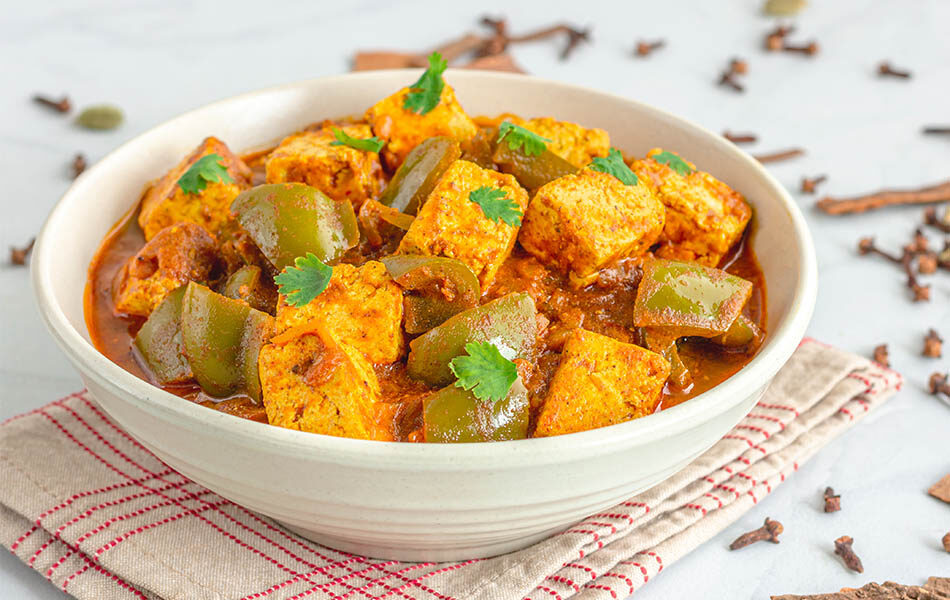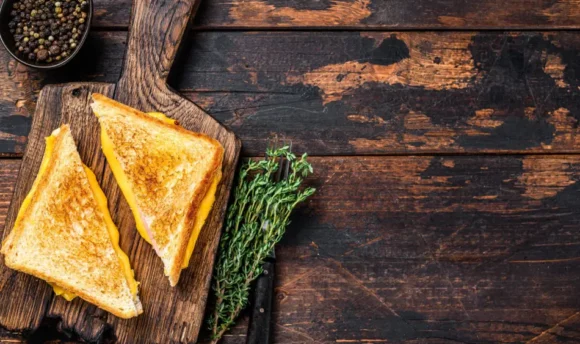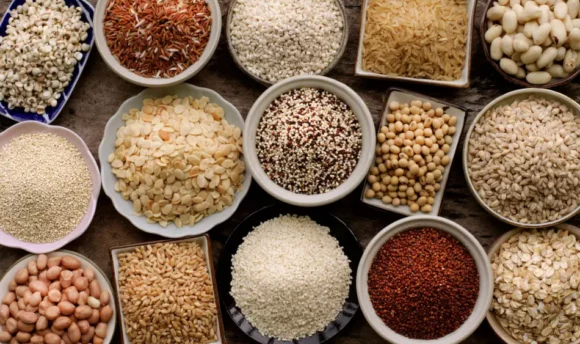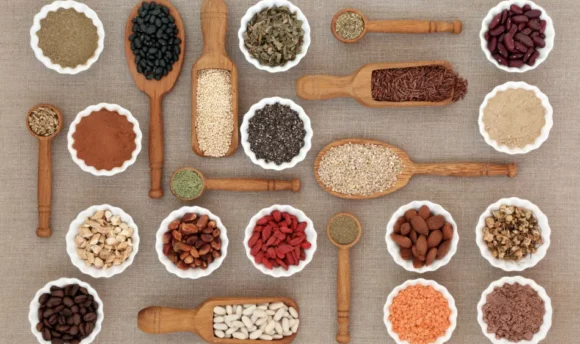Is Paneer Healthy? How to Make It Part of Your Diet
Ever wondered if consuming paneer is doing your body good? You might question if it’s best kept for occasional eating rather than frequent consumption. This article explores paneer’s health benefits and possible downsides to see where it falls on the healthy food list.

Is paneer a big part of your diet? If not, perhaps you’re wondering if it should be.
Paneer, also known as Indian cottage cheese, is a popular food in Indian cuisine. It is similar in color and texture to tofu, which, unlike paneer, is free from dairy. Fresh cheese is naturally rich in essential minerals, but does paneer comprise other properties that are not so good for you?
Here we disclose how healthy it is to eat paneer.
Is Paneer Healthy?
You can consider paneer healthy because it has a strong nutritional value. Several qualities make it a good choice for your overall health. These primarily include its high protein and calcium content, along with other minerals like phosphorus, potassium, and magnesium.
Good amounts of vitamin A and vitamin D further increase paneer’s nutritional value. Including paneer in your diet will benefit your bones, teeth, muscles, and heart. You might consider it one of the best sources of high-quality protein for those on a vegetarian diet.
The concern with paneer is that it does have a fair amount of calories and fat. Adding this Indian soft cheese to your daily diet will add more calories. In the right amounts, however, these properties should not eliminate the advantages of consuming paneer in moderation.
5 Health Benefits of Paneer
We’ve briefly covered some of the perks of eating paneer and why it makes a healthy dish. Still, you might need to learn what the above nutrients actually do for your body. Keep reading as we detail 5 key benefits you can acquire when you consume paneer.
#1 Good for bones and teeth
As a dairy product, paneer is rich in calcium – one of the most important minerals for your body. Calcium is responsible for forming and maintaining healthy bones and teeth. Adequate calcium levels can stop you from developing osteoporosis, a condition that weakens the bones.
#2 Supports your muscles
Paneer is a complete protein source, loaded with essential amino acids. These amino acids help grow and repair body tissue and increase protein synthesis – the process of making new muscle protein. Paneer makes a protein-rich diet that aids in maintaining and gaining muscle mass.
#3 May support weight loss
As paneer contains a lot of protein and healthy fats, it can curb hunger and keep you feeling full for longer. Combining a high-protein diet with regular physical activity can help you lose weight and enhance body composition by decreasing fat mass without decreasing muscle mass.
Make sure you monitor your caloric intake if you’re eating a lot of paneer. Too much paneer daily can add significant calories to your diet due to full-fat dairy products like milk and cream. You should also note if your paneer dishes contain other high-calorie ingredients.
#4 Strengthens the immune system
Paneer helps you maintain a robust immune system because it contains vital micronutrients. Magnesium increases the efficiency of white blood cells, which fight off infection and disease. Vitamin D and selenium regulate immune cell functions and help to shut down inflammation.
#5 Good for the heart
Paneer contains healthy fats that can support your heart health by reducing LDL cholesterol levels in the blood. It might help regulate blood sugar levels and promote fat loss, decreasing risk factors for heart disease. The magnesium content also protects against cardiovascular risk.
3 Possible Downsides of Paneer
A particular food can be good for you, but that doesn’t always mean you should eat it as much as possible. Like most foods, eating paneer can have a downside. Plus, it won’t suit every diet. Check out the potential drawbacks below to see if paneer is a good idea.
#1 May cause digestive troubles
For most people, paneer is easily digestible. However, raw paneer can be harder on the digestive system and cause bloating and indigestion. Sometimes, developing uncomfortable symptoms after you eat paneer could indicate that you have lactose intolerance.
#2 Contains lactose
The lactose content in this dairy product may be unsuitable for people who are lactose intolerant. Although the amount is quite low, it might trigger bloating, gas, abdominal pain, and diarrhea in some people. Many find it easier to digest regular cheese varieties than fresh paneer.
#3 Allergic reactions
Paneer can cause allergic reactions in people with dairy allergies because it contains cow’s milk. Additionally, some people might be allergic to the presence of whey proteins. Allergy symptoms typically include digestive issues like bloating, excess gas, stomach cramps, and diarrhea.
Nutrition Facts of Paneer
The following information will give you a better idea of just how healthy paneer is. These vital nutrition facts show how making paneer a recurring meal ingredient will benefit your body.
Below, you can see the nutritional information on soft paneer cheese.
Nutritional value per 100g
| Calories/Nutrients | Amount |
| Calories (kcal) | 299 |
| Net Carbs (g) | 22.5 |
| Fiber (g) | 0 |
| Sugar (g) | 23.3 |
| Fats (total) | 15.5 |
| Protein (g) | 15.9 |
| Cholesterol (mg) | 58 |
Source: https://fdc.nal.usda.gov/fdc-app.html#/food-details/2341143/nutrients
High in calories
Paneer is relatively high in calories, with 299kcal in a 100g serving. Eating lots of high-calorie foods can contribute to unwanted weight gain. As paneer is an overall healthy food, you can still reap the benefits despite the calorie count as long as you moderate your portions.
High in proteins
Paneer is a particularly excellent source of good-quality protein. Protein can provide instant energy to fuel your workouts while helping you hold onto your lean muscle mass. Studies show that 50–60g of high-quality protein daily is optimal for muscle protein synthesis.
High in fats
This cheese contains heart-healthy monounsaturated fatty acids, which help reduce LDL cholesterol levels. Nevertheless, it also contains saturated fats that can increase your risk of heart disease. You need both types in your diet, so you must find a good balance.
High in carbs
100g of paneer cheese has 22.5g of carbs. We need carbs to provide our bodies with glucose, which converts into energy and supports various bodily functions. However, those following the ketogenic diet might have to skip the paneer to lose excess fat.
Rich in vitamins and minerals
You should prioritize getting lots of vitamins and minerals in your diet. These nutrients are needed for optimal human health, and a lack of them can cause health complications. Paneer has calcium, sodium, phosphorus, potassium, zinc, selenium, and choline, to name a few.
Paneer vs. Tofu
| Product | Paneer | Tofu |
| Benefits | Complete protein source | Complete source of plant-based protein made from soy |
| Pros | High in calcium for strong bones and teeth High in protein May support weight loss Supports the immune system Contributes to heart health Vegetarian-friendly | Supports the immune system Contains fiber for a healthy digestive system May support weight loss Plant-based Vegan-friendly Dairy-free Low in calories |
| Cons | Not suitable for vegans Not suitable for milk allergies May cause digestive discomfort No fiber | May cause digestive discomfort Soy may trigger allergies |
Healthy Homemade Recipe With Paneer
Paneer is healthy, but how healthy it remains ultimately depends on your chosen dish. For example, paneer tikka or salads with pan-fried paneer are healthier than dishes such as paneer butter masala or shahi paneer. That’s because they contain fewer calories and saturated fats.
Paneer is the perfect protein source for vegetarian dishes. Here is a delicious Saag Paneer recipe you can make at home the next time you buy paneer. It works well as a main course or side dish.
Ingredients
- 2 tbsp cooking oil
- 1 tsp turmeric
- 1 tsp chili powder
- 1 tsp garam masala
- 450g paneer, cut into cubes
- 500g fresh spinach
- 1 large onion, finely chopped
- 3 cloves garlic, finely chopped
- 1 green chili, roughly chopped
- ½ lemon
Directions
- Add the cooking oil, turmeric, chili powder, and cubed paneer to a bowl and toss well. Set aside. Then, wash the fresh spinach and squeeze out as much water as possible before roughly chopping.
- Add the onion, garlic, and green chili to a separate bowl. Cook the paneer in a large frying pan on medium heat for approximately 8 minutes. Toss frequently until the cubes are evenly browned all over.
- Remove the paneer from the pan and set it aside. Add the onion mix to the same pan and reduce the heat. Season with a pinch of sea salt and black pepper. Fry until lightly colored, approximately 10 minutes. Stir in the garam masala to coat the onion mix.
- Add the spinach to the pan and cook for approximately 2–3 minutes. Pour 100ml water to release all of the aromatic spices. Throw in the paneer and reheat for a further 2–3 minutes. Squeeze over the lemon juice and serve.
Like the sound of this popular chili paneer dish? If so, you can check out the best nutrition apps to discover more healthy paneer recipes that remain low in calories, carbs, and sugars.
FAQs
Paneer is not a fattening food. In fact, including paneer in your meals can help you slim down because it contains protein and fat. These macronutrients promote satiety, reduce cravings, and can help you to stop snacking on excess calories throughout the day.
You can make a paneer substitute using a dairy-free recipe. You can find various paneer recipes online to suit vegan and other lactose-free diets. Many recipes tend to eliminate dairy milk and replace it with plant-based alternatives, such as soy milk.
Paneer can support you in losing weight. It has a good nutritional profile, with nutrients that prolong fullness and make you less likely to overeat. Cheese can aid weight loss, but if you eat it excessively, you might take in too many calories. A high intake can cause weight gain.
Paneer is a good choice of cheese for diabetes management. It has a low glycemic index and should not cause blood sugar spikes. It also contains magnesium, which contributes to healthy blood sugar levels. Furthermore, it might help you lose weight.
A Word From a Nutritionist
Paneer comprises many minerals that support your health long-term. It provides good amounts of protein containing essential amino acids. Your body can’t make these acids on its own, which are vital to several functions, including tissue repair and nutrient absorption.
Another great thing about paneer is that it’s a rich source of calcium, which promotes the smooth functioning of the nervous system.
Paneer has a mild taste, and pairing it with delicious spices delivers a treat for the taste buds. You can eat it alongside vegetables like spinach, tomatoes, and peppers for additional benefits. Try adding it to salads, vegetable curries, or a sandwich made with whole-grain bread.
Conclusion
We’re not saying you should eat paneer daily, but it is perfectly healthy to include in your diet. This Indian cottage cheese is rich in various vitamins and minerals to deliver a health boost. Add it to dishes containing ingredients that further nourish your body, like vegetables, herbs, and spices.

















































 Select your language:
Select your language: 








